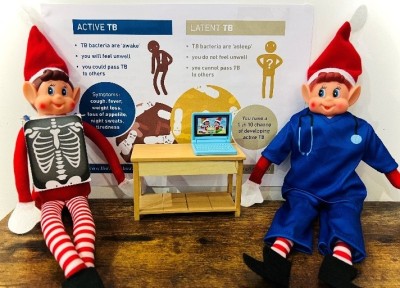Below you can view all the entries that made it into the Big Book of Best Practice 2023-24 from the clinical support services care group.
Contact details for each project can be found within the entries below. For more information about the Big Book of Best Practice, email cwp.
Team: Infection Prevention and Control Team
Contact: samantha.
What did we want to achieve?
The aim of the project was to raise awareness of infection prevention and control issues and common infections using an alternative format to the ones traditionally utilised. Information regarding infection control precautions and prevention of illness can sometimes be seen as inaccessible, overly clinical, or mundane. The aim was to try to present important, current and topical information throughout December 2023 in an eye-catching, fun and interactive way, whilst remaining informative and factual.
What we did
It was decided that as the winter season was approaching, the team would utilise the popular ‘Elf on the Shelf’ phenomenon as the basis for the campaign. The team set out identifying key themes that could be included across December and a list was drawn up. Resources were sourced and elves Edwin and Eric ‘joined the team’ on 1 December. A post was shared every day from 1 December to 25 December on both X (formerly Twitter) and the CWP staff Facebook group. Posts included topics such as sepsis, hydration, hand hygiene, cleaning, vaccinations and more!
The elves were involved in a wide range of activities, causing ‘mischief’ across the Trust and beyond, even accompanying the team to external training at Manchester Metropolitan University.
Results
Analysis of the data relating to the number of views, shares and comments was collected from X. For Facebook content, the number of likes and comments was used to indicate the engagement of the post. Overall, the elves gained 15,256 views across both platforms over the course of the month. On average posts on X, had around 600 views a day, with the maximum number of views for a single post peaking at 1,854. Posts on X were shared by several organisations such as The UK Sepsis Trust, Body Positive and Infection Prevention Society, as well as other NHS organisations and infection prevention and control teams. Feedback regarding the project was positive, particularly on the CWP staff Facebook group, with comments such as:
- “These are great - love seeing them every day.”
- “Loving the posts. Superb content.”
- “Absolutely brilliant!”
Next steps
The project was thoroughly enjoyable for the Infection Prevention and Control Team and was well-received on both platforms. The team plans to run the project again in the future and hopes to expand on this, with different topics to focus on. The team also hopes to share more content via the CWP Facebook page, which has over 2,000 members from across the Trust, to help reach staff who may not access emails or be aware of changes in guidance.

Contact: clare.
What did we want to achieve?
There are three levels of Towards Excellence accreditation, each designed to reflect the continuous development of the finance function, recognising the highest standards of financial competence and commitment to skills development. The Business and Value team embarked upon their Towards Excellence journey to provide evidence that they are providing good staff development practice as described in both national, local strategies and action plans. There are six standards:
- Infrastructure
- Personal development
- Professional development
- Finance workforce and career planning
- Corporate financial competence
- Business controls and policy
What we did
The process was owned by the entire team due to the size and the nature of what is involved. The process is important as it encourages a positive working environment where colleagues can work together and celebrate successes. A lead was identified for each of the six standards, who along with a supporting group, worked to provide over 60 pieces of evidence, including testimonials from across the Trust. This was assessed by a finance director who is part of the Towards Excellence Finance Assurance Group and then ratified by the Finance Leadership Council.
Results
The process has had a hugely positive impact on the team in terms of employee journey and experience, wellbeing, communication and celebrating achievements. The team now has equality and diversity leads to ensure the team is an inclusive place to work, including the One NHS Finance Equality, Diversity and Inclusion (ED&I) action plan. Wellbeing leads are in place to ensure the team is supporting the workforce and to signpost staff. They support staff training internally and externally through the Finance Skills Development Network. Improved communication and engagement has been achieved through the launch of the Engage programme and Business and Value Team meetings. Dedicated away days have been set up to give staff a much-needed thinking space.
Next steps
The team is already on their way to working towards level two of the Towards Excellence accreditation, which requires a minimum one-year growth period. The team is on a constant learning journey of continuous improvement and is working on a number of exciting new initiatives, including:
- Accelerated financial reporting.
- Improved finance reporting packs through the use of an enhancement to the existing North East Patches System.
- Business and Value perception survey to understand how the team is perceived across the organisation and how the team can help the Trust to meet the needs of its patients.
- New development opportunities for the team including shadowing, mentoring and growing talent.
Team: Patient and Career Experience Team
Contact: donna.
What did we want to achieve?
Volunteer to Career (VtC) was a 12-month pilot programme trialled at Bowmere Hospital, aiming to positively impact on workforce recruitment needs. It aimed to offer opportunities for volunteers to gain hands-on experience of working in a healthcare environment, harness clinical expertise and support to increase the number of volunteers with an interest in pursuing a career. The aim was also to increase the profile of volunteers, demonstrating the benefits of having volunteers in CWP services, including additional support, relieving staffing pressures and adding value to the quality of care provided. The right volunteering role can help in finding friendship, community engagement, learning new skills and career prospects. VtC also supports organisational improvement across key strategic components: clinical / health and care leadership; environment and culture; and volunteer to career pathways.
What we did
Successful bidding saw CWP secure a tender from Health Education England to deliver the programme with support provided by Helpforce. Funding enabled the recruitment of a VtC coordinator to lead the programme. A project steering group was set up, with an effective collaboration between several teams. Clinical teams liaised closely with the VtC coordinator in designing meaningful roles. The VtC pilot resulted in 22 people applying and 12 successful recruitments. Volunteers took part in role-related tasks to gain skills and knowledge in the clinical environment, with a provision of 30 to 60 hours over six months. Volunteers were also provided with a pastoral care approach to assist in achieving their career aspirations, including receiving one-to-one personalised supervision, bespoke wraparound training and career development support.
Results
During the pilot programme, all 12 volunteers completed the programme and with 494.65 collective hours given to volunteering. They supported over 570 patients and 250 staff members. Seven volunteers have now secured paid roles in health and care. One volunteer has started a university degree in a relevant subject. The programme has been highly successful and has attracted people into NHS employment who would not previously have been reached via traditional recruitment methods.
Feedback on the programme has included:
- “Without the VtC programme, I wouldn’t have thought it possible to enter into a health and care role. I feel lucky to call my new job ‘work’.” Volunteer
- “The VtC programme has been of benefit to both service users and staff on Cherry Ward, who have valued the addition of volunteer support within inpatient groups.” Sophie Williams, Occupational Therapist
- “The volunteer worked with me to make a game to play with my daughter. It was nice having someone else to support me on the ward.” Service user
Next steps
The success of the programme allowed for sustained funding for six months, a second cohort launch, 19 volunteers enrolled and expansion of the programme more widely across CWP. The vision is for the VtC programme to continue and develop, supporting Trust recruitment needs and supporting more people into NHS employment.

Contact: nick.
What did we want to achieve?
CWP’s ICT Services led a major two-year project to design, update and upgrade the Trust’s wide-area network (WAN) infrastructure, removing single points of failure and capacity restrictions within the Trust’s infrastructure such as firewalls, internet connections and building resilience. The project also aimed to redesign how traffic flows across the network for improved performance and improved cyber security. There were three key objectives: to replace CWP’s WAN, improve Wi-Fi in inpatient and resource centre locations; and to improve network performance, resilience and security posture.
What we did
- Phase one – Working with BT to scope, install and migrate each of the 35 locations to their new link with minimal impact and downtime.
- Phase two – Configuration of new firewalls and infrastructure. Running the old and new infrastructure in parallel whilst changes are implemented to avoid disruption to services. Wi-Fi coverage surveys and improvements to inpatient locations.
- Phase three – Final infrastructure changes to migrate from old infrastructure to new without service interruption. Migration of the Trust to the new FortiClient VPN. Completion of Wi-Fi surveys for coverage at resource centres.
Results
- Thirty-five CWP sites were migrated with a minimum bandwidth increase over their previous WAN link of 900%. Bandwidth out to the internet increased by 200%.
- Sites no longer reach maximum capacity following security updates allowing users to continue working without impact.
- Each site now has independent access to services located within the Health and Social Care Network (HSNC) such as clinical applications or on the Internet. HSCN network bandwidth increased by 100%.
- Improving access to SystmOne and EMIS and resilience for business continuity as staff can still access critical systems from a different CWP location.
- The project has removed four medium-to-high risks from the ICT Services risk register subsequently improving the overall cyber security position of the Trust.
- Removed network single point of failure at 1829 data centre.
- Firewalls are now hosted in two high availability data centres by BT.
- Wi-Fi is now installed into 74 CWP locations, provided by a resilient wireless controller pair.
- New armoured covers for wireless access points (WAP) have been installed, which allows for the location of wireless access points in optimal locations on wards where coverage could not be provided previously, whilst maintaining patient safety.
- Commissioned Wi-Fi coverage surveys across all CWP inpatient and resource centre locations, and remediated coverage issues where possible.
- New VPN solution for remote access (FortiClient) to support increasing agile workforce accessing the network remotely. FortiClient improves the security of CWP devices with vulnerability scanning, web security and content filtering.
Next steps
The plan is to expand on the new infrastructure to further improve CWP’s cyber security posture. The new infrastructure allows CWP to support new technologies to be implemented in the future, such as cloud telephony.
Honorable mentions
With nearly 100 entries received for the Big Book of Best Practice 2023-24, we have unfortunately been unable to include every entry in the final book. However, many of the projects – despite not being selected for full publication – deserve to be celebrated for the fantastic outcomes achieved.
You can view the honorable mentions for the clinical support services care group below:
- Vocational Learning Team - Apprenticeships
- Business Intelligence Team - Priority Programme collaboration
- ePR Team - SystmOne help centre
